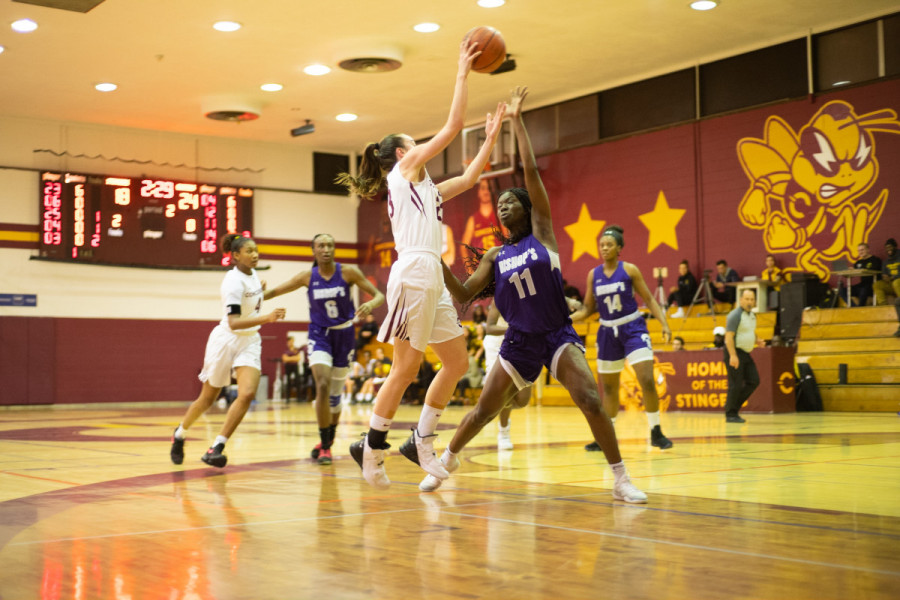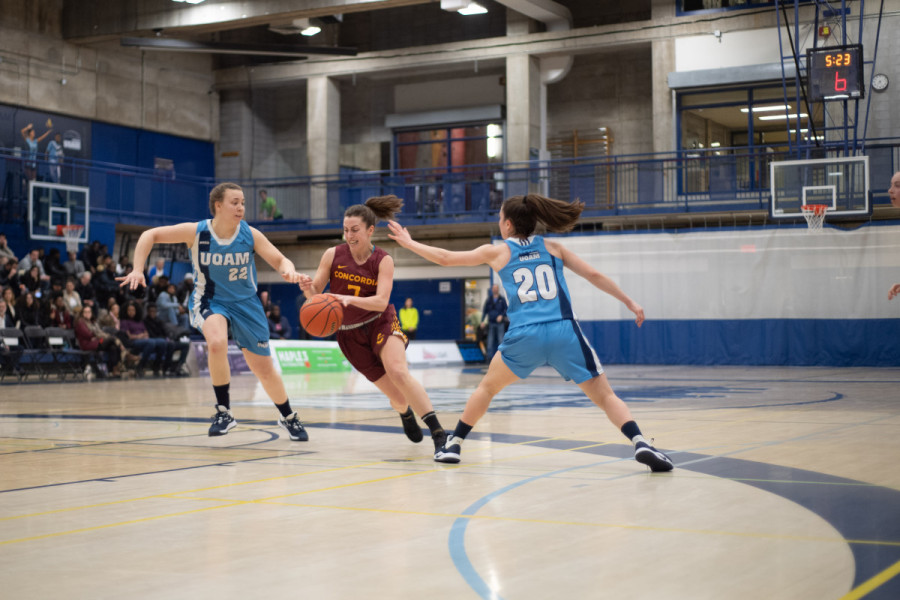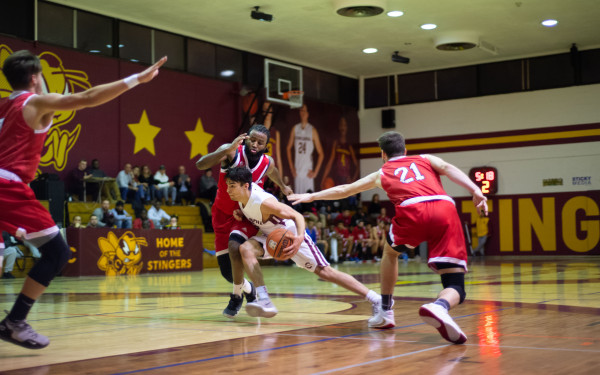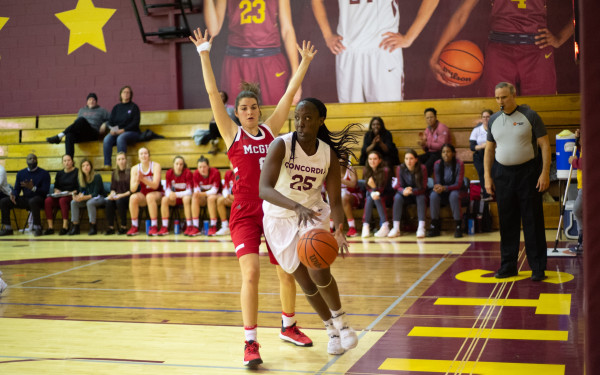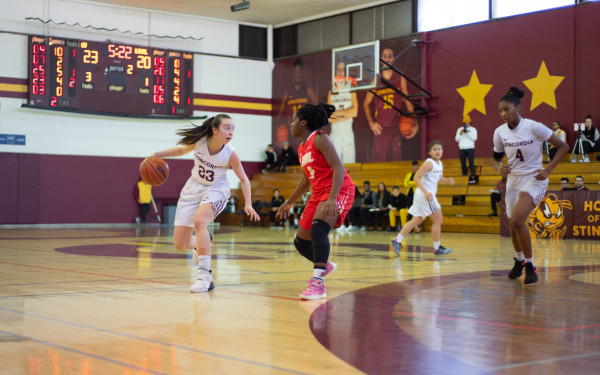Stingers Women’s Basketball Sees Poor Season as Bump not Trend
Playoff Absence Stings After Last Year’s Nationals Finish
For a second year in a row, the Stingers ended the regular season with a close loss to a first-placed Université Laval team. But the circumstances around each of those losses could not be more different.
Concordia ended the 2018-19 regular season in second place, making it to the Réseau du Sport Étudiant du Québec finals and earning a spot at Nationals. This season however, the final game was of no real consequence, as the Stingers were already anchored at the bottom of the standings and out of the playoffs before the game even began.
The Stingers did not go down without a fight. Laval’s 16-point lead in the second quarter was their largest of the game, but the Stingers chipped away, in large part thanks to a blistering fourth quarter performance from fourth year-guard Caroline Task.
“Even though it’s not playoffs or [for] a certain place in the standings, I think it’s just important to play for your family, play for the people who go out and support you,” said Task.
Task scored 13 of Concordia’s 16 points in the final frame, going three for four from three, converting two on back-to-back possessions to give the Stingers a 47-46 lead early in the fourth.
“I’m someone who’s super superstitious so I like to end on a good note […] My season’s over so I wanted to put on a good show and a good game for my last one in my fourth year,” Task added.
Task finished with a game-high 27 points, but the Stingers were unable to seal the victory, despite showing flashes of brilliance—something that has been a constant for the team all season.
What happened?
Looking at the record alone, it is easy to assume a complete drop in the quality of play from Concordia. But a closer look will show the margins are much finer.
Concordia experienced their share of blowouts: the 24-point walloping at Bishops comes to mind, but eight of their 12 losses this season were by less than 10 points. Five of them were by deficits of five points or less. A well-timed three, or a pair of made free throws and the Stingers record could be very different.

The Stingers were rarely, if ever, fully healthy this season. A lack of depth meant they were often unable to keep up the quality of play and consistency needed to win games.
“I think being able to rotate people in is going to give us more energy to focus on the little things. Things that we lose once we’re tired […] being more rested will allow us to be more disciplined,” said Task.
Rookie forward Serena Tchida sat out the entire season with an injury and Rhianna Mae Laing never put on Stingers colours. Their presence could have helped a depleted Stingers squad who also struggled to rebound.
“[We will be] building on our chemistry and doing it early, bringing in our rookies early and getting them acclimated to how we do things and buying into our culture” Tenicha Gittens
Guard Nelly Owusu missed the first five games of the season following her shoulder injury in the preseason, and Stingers leading scorer Myriam Leclerc missed the last three games and most of the game against Laval on the eighth of February when she hurt her knee.
Things were so bad that the Stingers played their home opener against Université du Québec à Montréal with only eight players on the team sheet and just seven seeing minutes on the floor.
“You look at our players out there and you can see they’re just gassed. They’re tired but they’re still fighting […] I’m not going to guarantee anything, but I think depth, real depth makes a difference,” said Gittens.
A lack of personnel also meant the Stingers were not always able to execute all aspects of their game plan effectively, particularly on defense.
Owusu’s absence at the beginning of the season was felt upon her return. The sophomore was second in total steals for the Stingers, after Leclerc.
_900_598_90.jpg)
Owusu and Leclerc are both bigger guards who can disrupt passing lanes and allow the Stingers to switch effectively between positions on the defensive end. The former is also the team’s defensive anchor, as she communicates with her teammates and is capable of changing the course of a game with her defense alone.
Missing players like this meant the Stingers were often unable to switch properly and that part of their game plan was often rendered void.
When all players are healthy and able to properly rest, the Stingers can play more of the suffocating defence they have shown flashes of since Owusu’s return.
The Stingers brought back most of their nationals run backcourt, but there was not the same continuity in the frontcourt, which had an almost entirely new rotation. Forwards Nikita Telesford and Shanice Neita took up most of the minutes with fellow newcomer Tchida out.
Both new players had experience south of the border, but were slow to gel into the team early on, particularly with different sets of rules in the National Collegiate Athletics Association game compared to USports and with multiple players injured.
This is something head coach Tenicha Gittens hopes to nip in the bud next season.
“[We will be] building on our chemistry and doing it early, bringing in our rookies early and getting them acclimated to how we do things and buying into our culture” said Gittens.
While she declined to share names, Gittens was clear on the type of player she was looking for in recruitment.
“I need defenders, I need bangers, I need rebounders, I need girls that can go out and get us a bucket and that’s what I’m bringing in” said Gittens.
The Stingers have a core of very good players, but this season those players were not in an ideal position to succeed. Gittens hopes smart recruiting and better luck with health can help her team get back where they need to be.
“Success doesn’t happen overnight. I think it’s one thing that I’ve proven is we put a championship level team on the floor, and this is one bump in the road,” said Gittens. “I have no doubt that if we were full go, full strength, with the players that were supposed to be here that we would be competing for another championship.”

